West Building Aerials – LEED; Sourced from Vancouver Convention Centre
The Vancouver Convention Centre is iconic in Vancouver’s downtown core for the distinctive green roof of its West building and the white sails of its original East building. Not only is it gorgeous, but the Convention Centre, as the city’s flagship event and conference venue, embodies a continued commitment to sustainability. “Our philosophy is that Vancouver is one of the most beautiful cities in the world, and we are proud to not only showcase it throughout our facility, but to also help ensure it remains beautiful for future generations through our sustainability practices,” says Adam Radziminski, Director of Sales for the Vancouver Convention Centre.
The Vancouver Convention Centre’s East building was originally the Canada Pavilion during Vancouver’s Expo 86 and later transitioned into becoming a convention facility. The West building was launched in 2009 and is the world’s first double LEED Platinum Certified Convention Centre. The building has a six-acre living roof, which features over 400,000 species of native grasses and flora. It’s the most sizeable green roof in Canada, and the biggest non-industrial living roof on the continent. “We also have an artificial marine reef built into the foundation of the West building, which improves local water quality and promotes the growth of a large variety of sea life,” says Radziminski.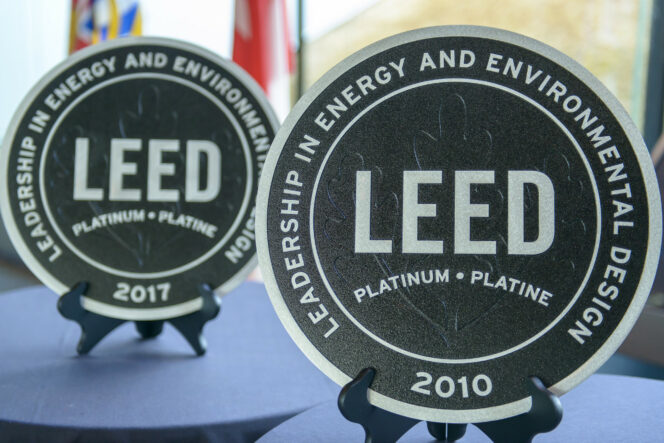
From our partners:
Sourced from Vancouver Convention Centre
The operations of the Convention Centre evidence a commitment to being an incredibly eco-friendly facility, which is no small feat given its size (466,000 square feet). A seawater geothermal system heats and cools the building, decreasing the use of air conditioning by about 30% and helping the Convention Centre surpass the Model National Energy Code for buildings by 65%. They also just upgraded their hot water steam system to minimize their energy usage even more. Finally, they collect rainwater for irrigation and run a wastewater treatment plant on site.
As a result, deciding on the Vancouver Convention Centre leads to a greener event or conference because of the building’s eco-features. Even better, the Convention Centre works to make sure every event is as sustainable as they can make it. “When event planners connect with our team, they can be confident that we will provide them with the knowledge and resources to help them plan a more eco-conscious event, whether that’s through emission reduction, waste sorting, blackwater recycling, and much more,” Radziminski says. Planners can request a sustainability report for their particular event, which will be educative for any future events they want to hold.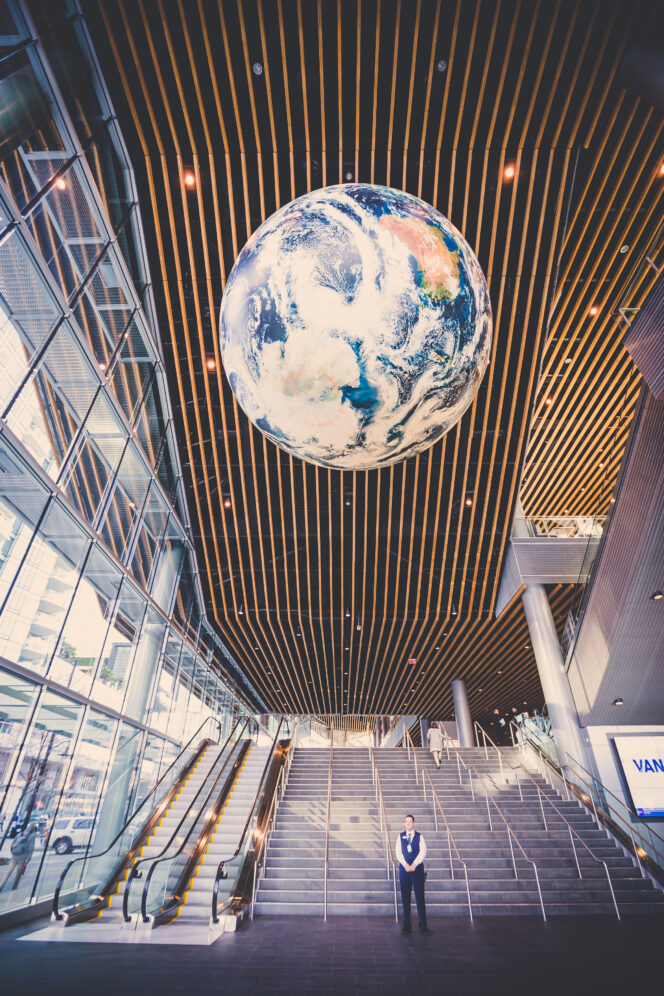
Sourced from Vancouver Convention Centre
Since events and conferences can generate a lot of paper or plastic materials, the Convention Centre has made waste reduction a priority, successfully diverting 93% of waste from landfills. “The Vancouver Convention Centre is a proud partner of Binners’ Project, a social enterprise program that offers waste-sorting services with the goal of helping individuals who face barriers to employment build skills and earn income,” Radziminski says.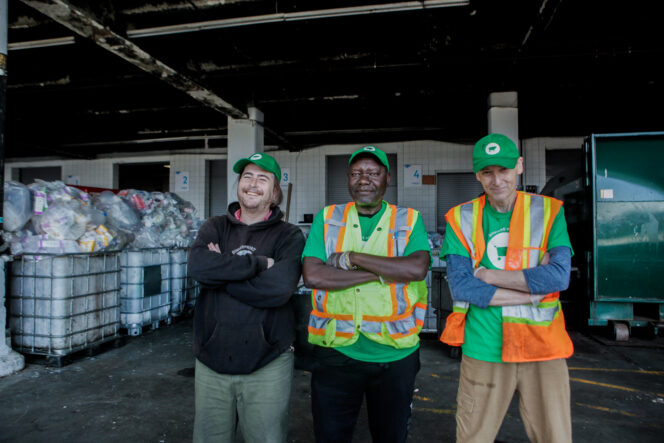
Binners’ Project workers at the Vancouver Convention Centre; left to right: Davin B,. Francis T., Brian R.; Photo sourced from Binners’ Project
Binners’ Project consists of a group of waste-pickers with an extremely valuable skillset: sorting materials that can be composted or recycled. Sean Miles, Director of Binners’ Project, explains, “The initial impetus around the creation of the project was to help organize this group that has been historically marginalized and stigmatized.” Binners’ Project draws upon binners’ expertise in order to help commercial and residential buildings with their waste sorting. Binners will often weigh containers before and after to quantify the positive impacts of their services. “The work that binners are doing is work,” Miles says. Designing a uniform is just part of the many efforts to legitimize what binners do to support themselves, as well as to contribute to making the city more sustainable.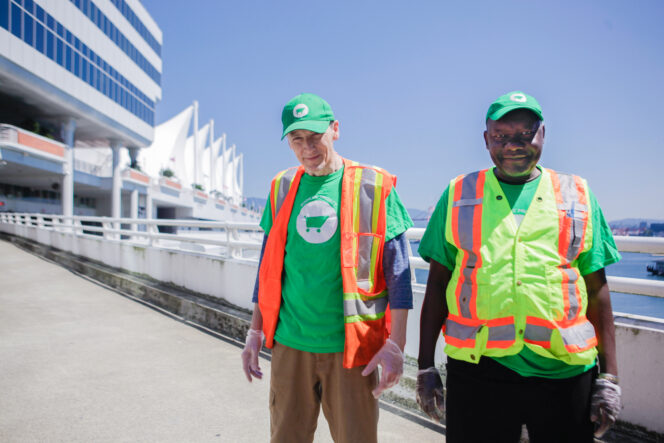
Brian R. and Francis T. (left to right); Photo sourced from Binners’ Project
Miles sees binners as actively contributing to the circular economy, as well as educating people about waste reduction. “Binners have been experts in waste reduction long before this project existed. We continue to advocate for reducing our carbon footprint,” says Miles. For example, Binners’ Project hosts an annual Coffee Cup Revolution event to promote the eco-benefits of refunding coffee cups and also sorts waste at public events, demonstrating what effective separation looks like.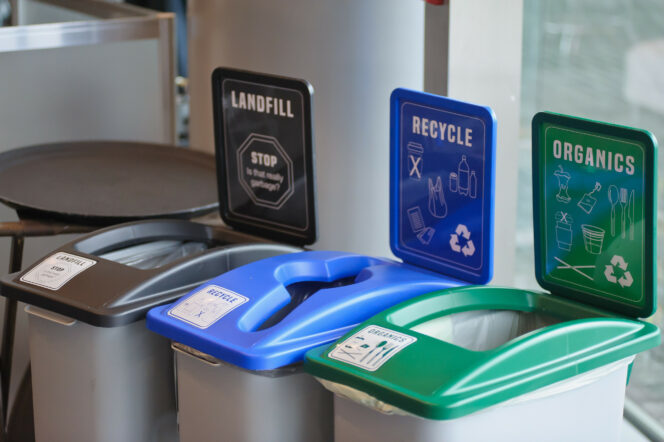
Sourced from Vancouver Convention Centre
Miles says that part of what makes Binners’ Project so special is the fact that binners are given a voice to advocate for their own livelihood. “We really try to maintain a grassroots approach. For the work that we do and the things that we’re working on, we get input and feedback from binners to help us with those decision-making processes,” he says. Miles adds that the organization aims to be barrier-free, such as making work shifts flexible to suit binners’ unique needs and preferences. Initiatives like a Binners’ Hook, which Vancouver residents can use for hanging items for pick-up, and a Universal Cart Initiative make binners’ work more accessible.
Ed Hawkey, Head Coordinator for Binners’ Project, worked many times at the Convention Centre prior to the pandemic. He says that he and the others working with him really enjoyed being at the Convention Centre because it provided them with numerous shifts in a pleasant environment. Even though they didn’t take up the offer, binners were offered use of the gym, weight room, and showers. Mostly, they had two people working per shift, but occasionally the volume required 4 people.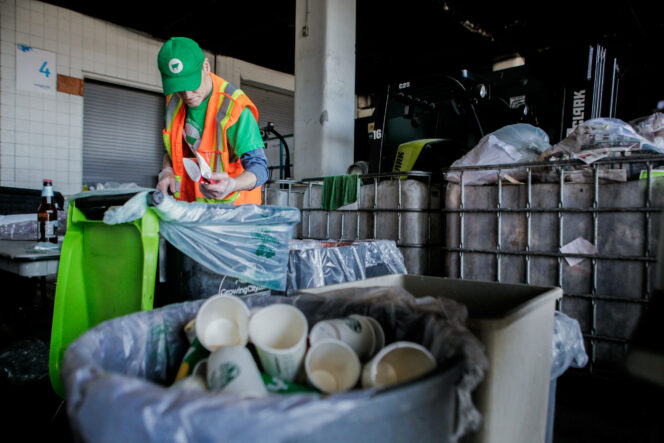
Sourced from Vancouver Convention Centre
Hawkey says their services involved efficiently sorting through bags of waste by removing cans and bottles for recycling as well as separating items, like coffee cups, that were compostable. Many of the cups from the Convention Centre were used for the Coffee Cup Revolution. He appreciated that the Convention Centre was a green venue, and that they had obviously invested in systems and equipment for streamlining waste reduction.
In addition to their partnership with Binners’ Project, the Convention Centre works with Habitat for Humanity and the Greater Vancouver Food Bank to reduce construction and food waste after events. And, through Sodexo Live, their official food and beverage supplier, the Convention Centre donates cans and bottles to United We Can, which creates economic opportunities for those marginalized in the Downtown Eastside. Sodexo Live makes everything from scratch, sources fresh local ingredients, and only uses Ocean Wise-certified sustainable seafood.
Both Binners’ Project and the Convention Centre are looking forward to helping out with events and gatherings that will restart with the relaxing of COVID-19 restrictions. “All of us at the Vancouver Convention Centre are excited to welcome guests back to our facility,” says Radziminski. In this case, they’re literally rolling out new eco-carpet in their West Ballroom. “In addition to ensuring the new carpet is eco-friendly and carbon-neutral, our team also worked to find a sustainable solution to dispose of the old carpet. We partnered with PAC Recycling to identify 32,580 square feet of material, more than half of the carpet removed, as healthy enough to rehome,” Radziminski says. In short, 10,602 kg of carpet was diverted from the landfill.
The Convention Centre is committed to continuing to form and maintain partnerships with local organizations, like Binners’ Project, in helping their clients host sustainable gatherings. “We want them to be inspired to experiment in Vancouver, and use their event here as a launching pad for sustainability practices that they can take on to all of their future events,” Radziminski says.
Miles also is incredibly enthusiastic about the services that his organization can provide a venue like the Convention Centre. “It’s great to have opportunities to work with partners and clients like the Convention Centre that can recognize the value we bring to their organization while still allowing them to focus on their targets and goals,” he says. Ultimately, it’s a win-win for binners, the Convention Centre, and the exciting events and conventions they’ll be hosting in the future.
By Tara Lee
Source Inside Vancouver
For enquiries, product placements, sponsorships, and collaborations, connect with us at hello@zedista.com. We'd love to hear from you!
Our humans need coffee too! Your support is highly appreciated, thank you!

